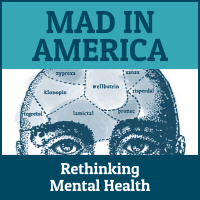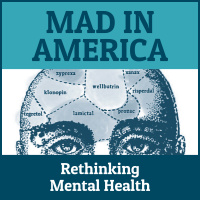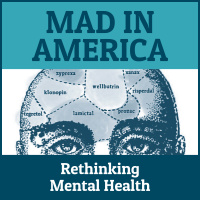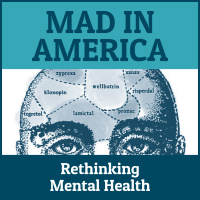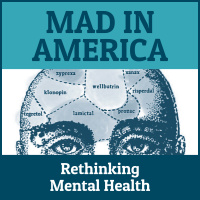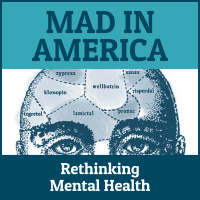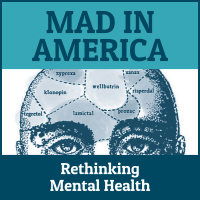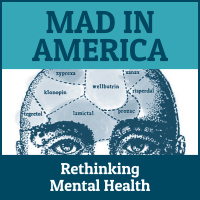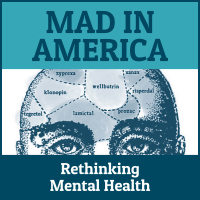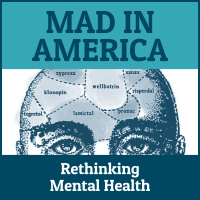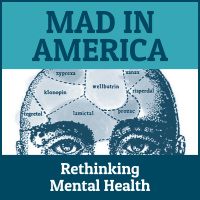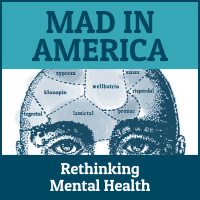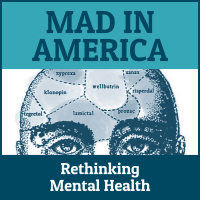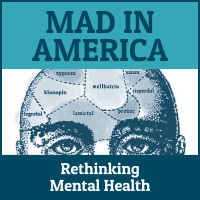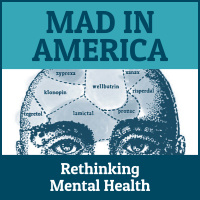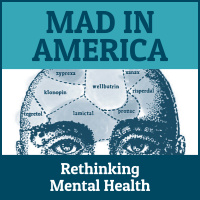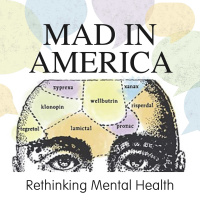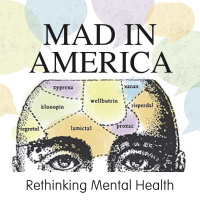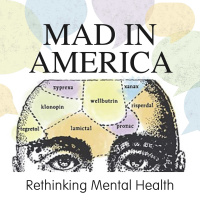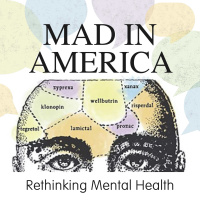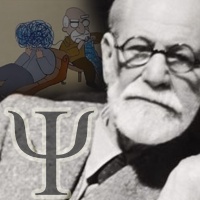Sinopse
Welcome to the Mad in America podcast, a new weekly discussion that searches for the truth about psychiatric prescription drugs and mental health care worldwide.This podcast is part of Mad in Americas mission to serve as a catalyst for rethinking psychiatric care. We believe that the current drug-based paradigm of care has failed our society and that scientific research, as well as the lived experience of those who have been diagnosed with a psychiatric disorder, calls for profound change. On the podcast over the coming weeks, we will have interviews with experts and those with lived experience of the psychiatric system. Thank you for joining us as we discuss the many issues around rethinking psychiatric care around the world.For more information visit madinamerica.comTo contact us email [email protected]
Episódios
-
Jim van Os and Peter Groot - When Assessing Antidepressant Withdrawal Methods, RCTs Fall Short
27/08/2021 Duração: 39minThis week we talk with Professor Jim van Os and Doctor Peter Groot about their latest study which looks at the effectiveness of tapering strips to help people get off antidepressant drugs. Jim van Os is Professor of Psychiatric Epidemiology and Public Mental Health at Utrecht University Medical Centre, the Netherlands and Peter Groot works with the User Research Centre of UMC Utrecht. They both are involved with the development and study of tapering strips which are pre-packaged, gradually reducing dosage tablets that facilitate tapered withdrawal from psychiatric drugs. In this interview, we discuss their latest research paper which examines tapering strips in real-world use. *** Download Mad in America's new mobile app here. Available for Apple or Android mobile devices, keep up to date as we publish new audio interviews or browse our archive.
-
Ursula Read - Rights Based Global Mental Health and Social Exclusion
25/08/2021 Duração: 53minUrsula Read is a research fellow and associate at King's College London. She holds a Ph.D. in anthropology from University College London, where she studied family experiences of mental illness and help-seeking and Ghana. Currently, her research addresses Global Mental Health, and she utilizes participatory research methods to explore the relationship between mental illness and social exclusion internationally. Her recent work focuses on mental health care in Ghana, drawing attention to the need for rights-based approaches to mental health care. In doing so, she questions the movement for Global Mental Health: asking what this movement is doing currently and imagining what it could become. Her research brings to light how those in the Global North and high-income countries can overlook what rights-based approaches to mental health care may actually look like when incorporated into Global Mental Health and enacted on the ground. She also is deeply concerned with the structural and social determinants of health
-
Michael Ungar - Looking Beyond Self-Help to Understand Resilience
28/07/2021 Duração: 53minMichael Ungar is the founder and director of the Resilience Research Centre at Dalhousie University in Canada. He is also a family therapist and professor of social work. He has received numerous awards, such as the Canadian Association of Social Workers National Distinguished Service Award (2012), and has authored around 15 books and over 200 peer-reviewed articles. Dr. Ungar’s work is globally recognized and centers on community trauma and community resilience. In particular, his work explores resilience among marginalized children and families, especially those involved with child welfare and mental health services, refugees, and immigrant youth. His research is spread across continents and challenges our traditional notions of trauma and resilience. Analyzing people’s risks and available resources, he scrutinizes simplistic ideas of individual perseverance and grit in the face of trauma. Instead, he implicates the role of context, circumstances, and ill-suited services in contributing to people’s psycholo
-
Patricia Rush - Getting to the Root Causes of Suffering
10/07/2021 Duração: 27minPatricia Rush, M.D., M.B.A. is an internal medicine physician whose scientific focus is complex chronic illness. Her over 40-year career has focused on working with underserved populations and promoting universal access to high-quality medical care. She spent 20 years in the Cook County (Illinois) Health System, including six years as director of their emergency department. From 2000-2008 ran a trauma-informed solo private medical practice in Chicago. During this time, she completed in-depth interviews with more than 500 patients, which led her to identify a group of high-risk individuals with serious illnesses who also had a consistent pattern of extreme stress at a young age, including profoundly disordered sleep and emotional distress. Until her retirement, Dr. Rush was also an Associate Professor of Medicine at the University of Chicago and now teaches neurodevelopment as a member of the Physician Workgroup of the Child Trauma Academy. She was a co-founder and serves as a co-director of the Center for th
-
Marcela Ot'alora - MDMA Assisted Psychotherapy and Therapeutic Humility
09/07/2021 Duração: 39minMarcela Ot'alora works with the Multidisciplinary Association for Psychedelic Studies (MAPS) as the principal investigator for government research into MDMA-assisted psychotherapy. In addition to her role as principal investigator, she also worked as a co-therapist during earlier phases of MDMA psychotherapy research and currently leads the MDMA therapy training for MAPS. Ms. Ot'alora also works as a therapist using both ketamine and fine arts to treat trauma. Ot'alora approaches her work with a humility learned from years of therapeutic experience: “My clients and the participants in our studies have taught me that their healing looks so different than anything I could have imagined. If I come in leaving that agenda, leaving that bias aside, and being present with whoever is in front of me, they will surprise me every time about how healing works for them.” In this interview, we discuss her research into MDMA-assisted psychotherapy and how the use of MDMA differs from more traditional substances such as ant
-
Michelle Funk - WHO and the Sea Change in Mental Health
12/06/2021 Duração: 25minMichelle Funk is the Unit Head of the Policy, Law, and Human Rights at the Department of Mental Health and Substance Use at the World Health Organization. She has created and leads the WHO Quality Rights Initiative that aims to assess and improve human rights standards in existing services and advance the full implementation of the UN Convention on the Rights of Persons with Disabilities (CRPD). In this interview, we discuss the launch of the new “Guidance on Community Mental Health Services: Promoting Person-Centred and Rights-Based Approaches.” The document is grounded on the principles of recovery and rights-based approaches. It presents successful examples of best practices in mental health service provision respecting dignity, moving to zero coercion, and eliminating neglect and abuse. Among the best practices showcased in the document are Open Dialogue as practiced in Tornio, Finland, Soteria Berne in Switzerland, Afiya House in Western Massachusetts, Basal Exposure Therapy in Norway, and Hearing Voice
-
Ilana Mountian - Discourse, Drug Use, and Psychiatry
09/06/2021 Duração: 47minIlana Mountian is a researcher drawing on psychoanalytic, critical, decolonial, and feminist philosophies. She is the author of Cultural Ecstasies: Drugs, Gender, and the Social Imaginary, exploring discourses around drug use, gender, and drug policy. She is currently working on a book that will be published later this year by Routledge about otherness and mental health, focusing on immigration, drug use, and transsexuality. Mountian is a member of the Discourse Unit, a group led by well-known critical psychologists Erica Burman and Ian Parker. The Discourse Unit is dedicated to providing teaching resources for qualitative and feminist work, producing radical academic work, and developing critical perspectives in action research. In addition to her work as a researcher, Mountian is a psychoanalyst and a postdoctoral lecturer at the University of Sao Paulo Brazil and Manchester Metropolitan University. In this interview, she discusses intersectionality and drug use, the disease model of addiction, psychiatric
-
Psychiatric Drug Withdrawal - Post Withdrawal Experiences
28/05/2021 Duração: 01h34minThis week on the MIA podcast we are providing the audio taken from our recent psychiatric drug withdrawal town hall held in May 2021. For our third discussion, we are examining protracted problems that can arise after psychiatric drug withdrawal. Sometimes referred to as post-acute or post-withdrawal syndromes, these experiences can include chronic health problems and sexual dysfunction. What do we know and not know about responding to long- term health problems after coming off psychiatric drugs? For references and slides mentioned in the discussion, visit this link: https://www.madinamerica.com/pdwref/ Panelists Adele Framer Adele Framer resides in San Francisco, USA. A survivor of 11 years of antidepressant withdrawal syndrome, in 2011, under the pseudonym Altostrata, she founded the peer support site SurvivingAntidepressants.org, currently containing more than 6,000 longitudinal case histories from its 14,000 members. A widely recognized patient advocate, she is a lay expert in psychiatric drug tapering a
-
Hannah Pickard - Responsibility Without Blame in Therapeutic Communities
26/05/2021 Duração: 56minHanna Pickard is a Bloomberg Distinguished Professor of Philosophy and Bioethics at Johns Hopkins University. She is also appointed with the William H. Miller Department of Philosophy, the Berman Institute of Bioethics, and the Department of Psychological and Brain Sciences. Her expertise is deep and spread across a wide variety of disciplines. As an analytic philosopher, she specializes in philosophy of mind, philosophy of psychiatry, moral psychology, and clinical ethics. She also worked for a decade at The Oxfordshire Complex Needs Service, a specialist service in the NHS for people diagnosed with personality disorders and complex needs. Her work tends to address the sticky debates that arise in clinical practice. She has over 35 academic publications and has co-edited The Routledge Handbook of Philosophy and Science of Addiction. Pickard maintains an important thread between clinical work in the real world and her philosophical writings, attending to topics like the nature of mental disorders, delusions,
-
Katrina Michelle - Psychedelics, Transformative Experiences and Healing
12/05/2021 Duração: 42minKatrina Michelle is a psychologist and the founder and director of The Curious Spirit, a transpersonally oriented psychotherapeutic practice that encourages transcendent personal exploration to remedy psychological suffering. She is a holistic psychotherapist currently serving as faculty at Columbia University School of Social Work and The Institute for the Development of Human Arts. In addition to her practice, she also serves as the director of harm reduction for the Multidisciplinary Association for Psychedelic Studies (MAPS) and formerly worked as the executive director of the American Center for the Integration of Spiritually Transformative Experiences (ACISTE). To demystify awakening experiences through storytelling and art, she is also producing the film When Lightning Strikes. Beginning in the world of traditional social work, Michelle was drawn to transpersonal psychology after her own spontaneous spiritually transformative experience. She now works to help create communities capable of holding these
-
Hannah Zeavin - Questioning the Moral Panic Around Teletherapy
28/04/2021 Duração: 35minHannah Zeavin is a leading scholar investigating how mediated communications and technology impact our intimate relations. Her most recent work tackles teletherapy and digital mental health communications, which have seen a boon throughout the pandemic. Zeavin is a Lecturer in the Departments of English and History at the University of California, Berkeley, and affiliated with the Berkeley Center for Science, Technology, Medicine, and Society. Zeavin is also a visiting fellow at the Columbia University Center for the Study of Social Difference. She received her Ph.D. from the Department of Media, Culture, and Communication at NYU in 2018. Her first book, The Distance Cure: A History of Teletherapy, will be published by MIT Press this summer. Zeavin serves as an editorial associate and author for numerous publications, including the Journal of the American Psychoanalytic Association. She is also a co-founder of The Science, Technology, and Society Futures Initiative. In this interview, she discusses her upcom
-
Psychiatric Drug Withdrawal - Exploring the Science
26/04/2021 Duração: 01h30min*** Our next psychiatric drug withdrawal town hall discussion will be held on May 14 2021, register here: https://www.eventbrite.co.uk/e/150023595613 *** This week on the MIA podcast we are providing the audio taken from our recent psychiatric drug withdrawal town hall held in March 2021. This discussion was aired live on March 12, 2021 and the panelists are Dr Giovanni Fava, Dr Peter Groot, Dr Mark Horowitz and Professor Joanna Moncrieff. For this discussion, we asked what science and research can tell us about the experience of withdrawal. We discuss research effort that has called into question long-held professional beliefs about the effects of psychotropic drugs on the brain and nervous system. Panelists Giovanni Fava Dr Giovanni Fava is Clinical Professor of Psychiatry at the State University of New York at Buffalo. He has authored more than 500 scientific papers and performed groundbreaking research in several fields. He is editor-in-chief of the journal Psychotherapy and Psychosomatics. Peter Groot Dr
-
Julia Rucklidge - Nutrition and Mental Health
17/04/2021 Duração: 56minThis episode of “Mad in the Family” discusses the links between nutrition and mental health, and the science that’s showing that diet may help improve or even prevent mental health issues in children and adults. Julie Rucklidge: "Taking a one-a-day gummy bear might prevent you from getting scurvy, but it's not meeting the optimal amount that your brain needs.” Julia's interest in nutrition and mental health grew out of her own research showing poor outcomes for children with psychiatric illness despite conventional treatments. In the last decade, the Mental Health and Nutrition Research Group has been running clinical trials investigating the role of broad-spectrum micronutrients in the expression of issues such as ADHD, mood disorders, anxiety, and stress associated with traumatic events, such as earthquakes and mass shootings. Julia's interest in nutrition and mental health grew out of her own research showing poor outcomes for children with psychiatric illness despite conventional treatments. In the last
-
Anne Guy - How Therapists Can Help With Psychiatric Drug Withdrawal
14/04/2021 Duração: 46minAnne Guy is a member of the council for evidence-based psychiatry (CEP) and works with the secretariat for the All-party Parliamentary Group for Prescribed Drug Dependence. She's the lead editor and author of “Guidance for psychological therapists: enabling conversations with clients taking or withdrawing from prescribed psychiatric drugs.” (an abridged version can be found here). This guide is endorsed by the British Association for Counseling and Psychotherapy, the UK Council for Psychotherapy, the National Counseling Society, and the British Psychological Society. Dr. Guy is also a practicing psychotherapist that does not rely on a model of diagnosis to help her clients. Beginning as a claims manager for an insurance company, she got an up-close view of how the healthcare system worked and saw the biggest problems clearly. This “systems view” followed her into her work as a psychotherapist, where she attempts to navigate systemic failures that have resulted in the over-prescription of psychiatric drugs. In
-
Peter Sterling - What Does Our Species Require for a Healthy Life?
31/03/2021 Duração: 50minPeter Sterling, now retired from the University of Pennsylvania, is a well-known neuroscientist, having co-authored a popular text, Principles of Neural Design. He is a lifelong political activist, and historians of psychiatry may remember his public criticisms of psychiatric treatments in the 1970s, most notably of electroshock and antipsychotics. He could also be described as an ethnographer, as his travels among the indigenous people of Panama, where he now lives part-time, influenced his understanding of how the human brain was shaped in response to the demands of early hunter-gatherer societies. He is the author of a recent book titled, What is Health: Allostasis and the Evolution of Human Design. His books raises this provocative question: What does our species require for a healthy life? And can we achieve this with drugs?
-
Bethany Morris - Feminism, Psychoanalysis and Critical Psychology
17/03/2021 Duração: 32minBethany Morris is an assistant professor of psychology at Point Park University in Pittsburgh, Pennsylvania, where she teaches and does theoretical and qualitative research. Dr. Morris is a transdisciplinary scholar whose work bridges critical psychology, literature, philosophy, history, psychoanalysis, and film studies. Early in her career, at Prince Edward Island University and Brock University in Canada, she studied alternative anti-psychiatric interventions for early-onset schizophrenia as illuminated by children’s literature. During this time, she was also thinking critically about issues of women’s stigmatization and oppression. In recent years, her work has focused on using the ideas of French psychoanalyst Jacques Lacan to gain a further critical understanding of the oppression of women, psychology’s medical model, and other issues related to social justice. Her recent publications include the co-authored book Subjectivity in Psychology in the Era of Social Justice, as well as her first solo-authored
-
Sherry Julo, Ed White and John Read – Online Support Groups for Psychiatric Drug Withdrawal
13/03/2021 Duração: 52minThis week on the MIA podcast, we discuss a recent paper that considers the support provided by online support groups when people seek help for psychiatric drug withdrawal. The paper is entitled ‘The role of Facebook groups in the management and raising of awareness of antidepressant withdrawal: is social media filling the void left by health services?’ It was published in the journal Therapeutic Advances in Psychopharmacology in January 2021 and the authors are Sherry Julo, Ed White and John Read. "In June 2020, the groups had a total membership of 67,125, of which, 60,261 were in private groups. The increase in membership for the 13 groups over the study period was 28.4%. One group was examined in greater detail. Group membership was 82.5% female, as were 80% of the Administrators and Moderators, all of whom are lay volunteers. Membership was international but dominated (51.2%) by the United States (US). The most common reason for seeking out this group was failed clinician-led tapers." Links and further in
-
Donzaleigh Abernathy - Creative Maladjustment
27/02/2021 Duração: 53minActor, singer, writer, and civil rights activist Donzaleigh Abernathy is goddaughter of the Reverend Dr. Martin Luther King, Jr., and daughter of the Reverend Dr. Ralph David Abernathy, King's best friend and partner in the civil rights movement — who co-founded the Southern Christian Leadership Conference and became president of it after King's assassination on April 4, 1968. Her mother was civil rights activist Juanita Abernathy. As a child, Abernathy witnessed some of the most inspiring and formative moments of the civil rights movement — and some of the most sobering. She also grew up knowing and loving the man she called Uncle Martin, whose stances against racism, poverty, and war remain as relevant today as they were when he first voiced them. Also relevant are his calls for creative maladjustment, meaning the refusal to adjust to society's many ills. Abernathy is the author of Partners to History: Martin Luther King, Ralph David Abernathy and the Civil Rights Movement. She also contributed to the Smit
-
Helen Spandler - Uncomfortable Truths in Survivor Narratives
24/02/2021 Duração: 47minHelen Spandler is a Professor of Mental Health Studies at the University of Central Lancashire in the UK. She is the managing editor of Asylum, a non-profit radical mental health magazine. She currently holds the Welcome Trust Investigator Award and is the principal investigator on a new research project about the role of MadZines (comics and graphic memoirs created by people with lived experience of psychosocial disabilities) in contesting mental health knowledge and practice. With over four books and 40 publications to her name, professor Spandler has applied her expertise to a wide range of concerns. She has written about the psychiatric survivor movement, alternate interventions such as therapeutic communities, psychosocial disability, and grassroots activism concerning patient rights. In this interview, she discusses the importance of placing human suffering before theoretical preferences. She argues that understanding truly listening to psychiatric survivors requires us to get accustomed to uncomfortabl
-
Jill Nickens - The Akathisia Alliance for Education and Research
13/02/2021 Duração: 37minThis week on the Mad in America podcast we turn our attention to prescription-drug-induced akathisia and joining me to discuss this is Jill Nickens. Jill is the president and founder of the Akathisia Alliance for Education and Research, a nonprofit organization formed by people who have personal experience of akathisia. The group includes biochemists, psychologists, nurses, attorneys, business owners, and others who have survived akathisia, suicidality and devastating personal losses due, in part, to a lack of awareness by medical professionals. They have come together to inform and raise awareness to help minimize the risk of developing akathisia. Akathisia is an extremely distressing neurological disorder that causes severe agitation, an inability to remain still and an overwhelming sense of terror. It is primarily caused by prescribed medications and the most common offenders are anti-psychotics, antidepressants, anti-nausea medications and antibiotics.

